“Like all genuine artists, Kushner writes not as he should but as he must, and his diffuse discursiveness is undoubtedly in part a function of his temperament. Still, the success of Angels in America seems to have confirmed Kushner in the belief that the iron law of economy that governs traditional theatrical storytelling does not apply to him…”
Archives for July 2011
TT: A little traveling music, maestro
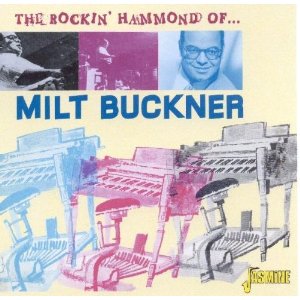 Mrs. T and I depart today on a two-week tour of theater companies in Maine, Massachusetts, and New Hampshire. We’ll be doing a lot of driving, and I thought it might amuse you to know what CDs I’ve packed for the road:
Mrs. T and I depart today on a two-week tour of theater companies in Maine, Massachusetts, and New Hampshire. We’ll be doing a lot of driving, and I thought it might amuse you to know what CDs I’ve packed for the road:
• Pat Metheny, What It’s All About
• The Rockin’ Hammond of…Milt Buckner
• Stephen Sondheim: The Story So Far…
• John Wesley Harding, Who Was Changed and Who Was Dead
• Booker T. and the MGs: The Definitive Soul Collection
• Donald Fagen, Morph the Cat
See you elsewhere!
TT: Snapshot
“All the Cats Join In,” a 1946 Walt Disney cartoon animated by Fred Moore and accompanied by Benny Goodman’s orchestra. This cartoon originally appeared as part of the animated feature Make Mine Music:
(This is the latest in a weekly series of arts-related videos that appear in this space each Wednesday.)
TT: Almanac
“I had decided to write about candy because I assumed it would be fun and frivolous and distracting. It would allow me to reconnect to the single, untarnished pleasure of my childhood. But, of course, there are no untarnished pleasures. That is only something the admen of our time would like us to believe. Most of our escape routes are also powerful reminders; and whatever our conscious motives might be, in our secret hearts we wish to be led back into our grief.”
Steve Almond, Candyfreak: A Journey Through the Chocolate Underbelly of America
TT: English, the not-so-universal language
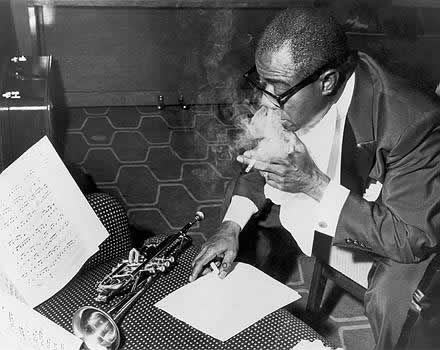 I just got another wonderful e-mail from the Bulgarian translator of Pops: A Life of Louis Armstrong. Here it is, verbatim and in its entirety:
I just got another wonderful e-mail from the Bulgarian translator of Pops: A Life of Louis Armstrong. Here it is, verbatim and in its entirety:
I am writing to you again because I am wondering how to interpret Armstrong’s explanation of [Sid] Catlett’s irresponsibility: “He played the chicks, he ran with the cats, he played the horses, played the numbers” (especially the horses). I am not sure how to understand these metaphors, as well as how exactly they fit together.
Could you also explain to me the meaning of the title of Armstrong’s article “Stomping Piano Man”?Also, I am not sure if I understand correctly the title “Keep the horn percolating” and the related statement, made by Armstrong. Could you say that in other words in order to get closer to the meaning?
And one more question related to a chapter title. Which one of the meanings of “sigh” has to be used in the context of “I don’t sigh for nothing”?
Believe me, I did my best…
UPDATE: Several readers have asked how I answered these questions, so here goes:
• “He played the chicks” means “He had romantic and/or sexual involvements with many women.”
• “He played the horses, played the numbers” means “He gambled.” “To play the horses” is to bet on horse races. “The numbers” was a slang name for an illegal city-wide lottery-like game that was popular in most American cities–and especially in their black ghettoes–prior to the introduction of legal state lotteries in the U.S.
• “He ran with the cats” means “He spent time with his friends.”
• In jazz, “stomping” means “hard-swinging,” and a “piano man” is simply someone who is known for playing the piano.
• In this context, “Keep the horn percolating” means “Keep me musically inspired by having sex with me.”
• “I don’t sigh for nothing” means “I have no regrets.”
TT: Just because
Duke Ellington performs “Mood Indigo” in 1952:
TT: Almanac
“Most forms of rage, after all, are only sloppy cloaks for grief.”
Steve Almond, Candyfreak: A Journey Through the Chocolate Underbelly of America
TT: Forty-three things you may already know about me
Pardon my redundancy, but:
• Music is my first language, words my second. At bottom I still think of myself as a musician.
• I’m a pessimist–but an ebullient one.
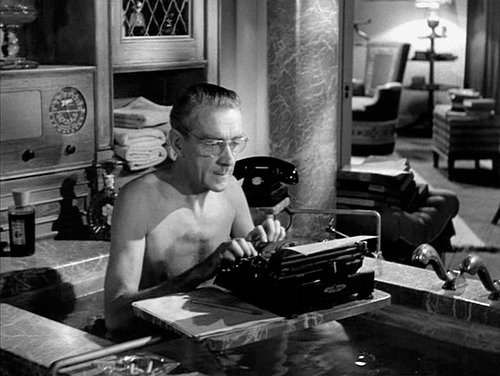 • I’m a workaholic, but only out of necessity. If I became a rich man tomorrow, I’d probably stop writing for publication as soon as I made all of my outstanding deadlines–though I’m pretty sure that I wouldn’t stop blogging or tweeting.
• I’m a workaholic, but only out of necessity. If I became a rich man tomorrow, I’d probably stop writing for publication as soon as I made all of my outstanding deadlines–though I’m pretty sure that I wouldn’t stop blogging or tweeting.
• I love hot dogs, trains, waterfalls, and the lyrics of Johnny Mercer.
• I loathe yappy dogs, preachy art, most of the music of Wagner, and all people who talk loudly on cellphones in public places.
• I’m almost never attracted by conventionally beautiful women. I prefer sharply drawn or “funny” faces, and I can rarely resist a jolie laide.
• With three exceptions, I’ve never been attracted to blondes.
• I am, alas, almost entirely indifferent to my personal appearance.
• I think–perhaps wrongly–that I have a gift for friendship.
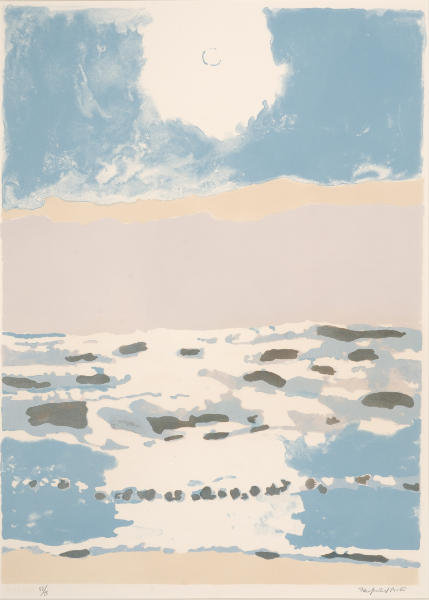 • I wish I could live next to the sea.
• I wish I could live next to the sea.
• I enjoy pretending to be an Anglophobe, especially when in the company of Anglophiles.
• The secret of my literary success (such as it is) is that I write fast, know what I think, and don’t equivocate.
• So long as I didn’t have to lie in print, I’d be perfectly glad never to write another bad review. Nothing makes me happier than to be told that one of my reviews helped a show to sell out.
• Unrequited love’s a bore, and I’ve had it pretty bad.
• I wish I wrote more simply.
• I talk a lot–often too much–but mainly as a tool to figure out what I think. I’d rather listen. (Really.)
• I snore.
• I hate being clumsy, but I’ve learned to live with it.
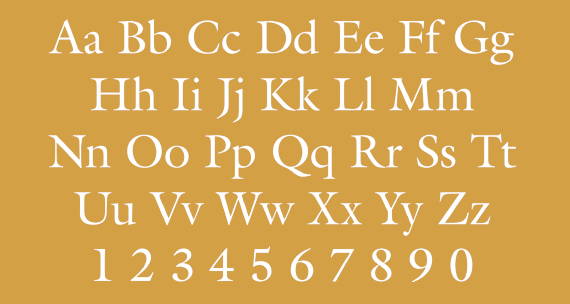 • Galliard is my favorite typeface.
• Galliard is my favorite typeface.
• I try very hard to be fair.
• I’m not afraid to be wrong–and not unwilling to admit when I am.
• If I had to spend the rest of my life listening to one kind of music, and it couldn’t be classical music or jazz, I’d pick Brazilian music.
• To me, all politicians are guilty until proven innocent, and sometimes even afterward.
• I wish I were funnier, but at least I’m a good audience. Make me laugh and I’ll love you forever.
• I hate clutter.
• I can always watch a film noir or a good western.
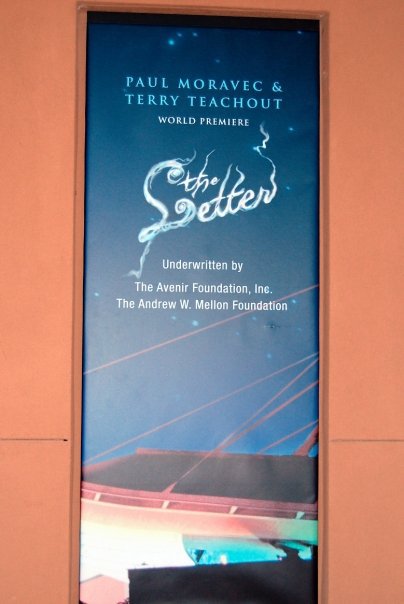 • The professional achievement of which I’m proudest is my libretto for Paul Moravec’s The Letter. Pops: A Life of Louis Armstrong comes next.
• The professional achievement of which I’m proudest is my libretto for Paul Moravec’s The Letter. Pops: A Life of Louis Armstrong comes next.
• I’m also very proud of having written about Diana Krall and Maria Schneider early in their careers.
• I prefer plays to novels. If absolutely necessary, I could go the rest of my life without reading another novel, though I wouldn’t want to.
• That said, the book I most wish I’d written is The Great Gatsby.
• I think The Rules of the Game is the greatest of all movies, Falstaff the greatest of all operas, The Four Temperaments the greatest of all ballets, and David Cromer’s productions of Our Town and The Glass Menagerie the greatest shows I’ve ever seen on stage.
• My top five classical composers are Haydn, Schubert, Ravel, Copland, and Britten. (Note that I didn’t say “greatest”!)
• Jim Hall is my favorite living jazz musician.
• I adore being a critic, but if I could make a decent living working in the theater, I’d do that instead.
• I almost never use semicolons.
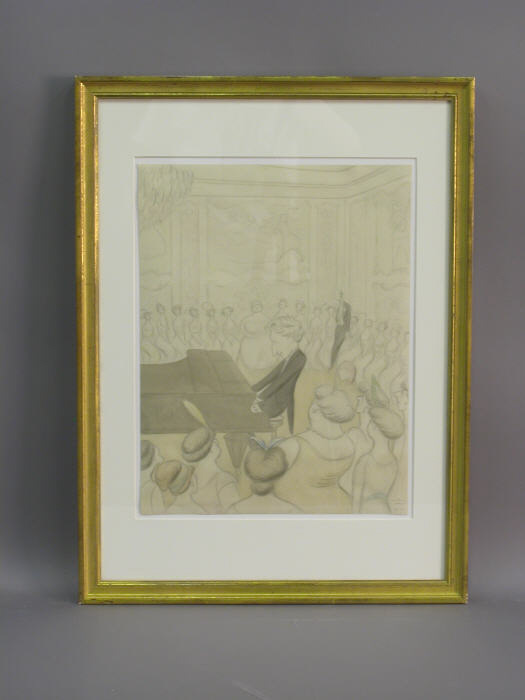 • My proudest possession is my Max Beerbohm caricature of Percy Grainger.
• My proudest possession is my Max Beerbohm caricature of Percy Grainger.
• If I could have anybody else’s speaking voice, it’d be James Mason’s.
• If I could play piano like anybody else, it’d be Nat Cole or Ellis Larkins. (I’d happily flip a coin to choose between them.)
• I’m bad with names, and even worse with birthdays.
• Samuel Johnson is my hero.
• I bore easily–too easily.
• I have two mottoes, Always look forward and If there’s no alternative, there’s no problem.
• I fell in love with Mrs. T at first sight.
